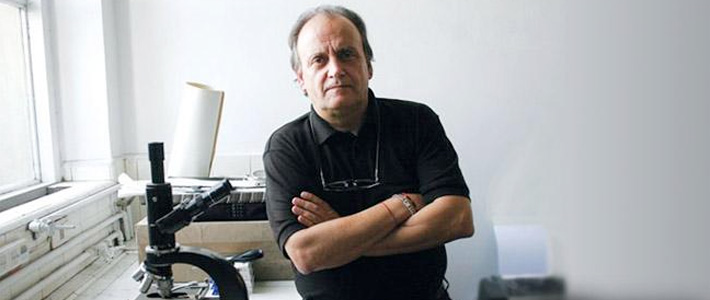
We are very sad to hear the news of the death of Professor Andres Carrasco, whose research showed that glyphosate and Roundup cause malformations in embryos.
Andres Carrasco was a brilliant and honest scientist and a fearless campaigner for truth. He will be sadly missed.
Andrés Carrasco, scientist and activist: thank you
Lavaca.org, 10 May 2014
http://www.lavaca.org/notas/andres-carrasco-cientifico-y-militante-gracias/
[In Spanish; rough English translation of excerpts only by GMWatch]
Andrés Carrasco, the scientist who confirmed the devastating effects of glyphosate, investigated sprayed people, and questioned science in the service of corporations, has died. We publish below the last interview he gave and also "Happiness can be a political issue?", the interview [with Carrasco] that [radio station] Decí Mu broadcast.
… The scientist Andrés Carrasco told how he decided to release his investigation into the lethal effects of glyphosate. He was in the south, fishing, just enjoying the beauty of the natural order. He knew his findings were crucial and felt that the perfect silence around him was a huge scream. "I had to do something." To do it, he just needed to find "a serious and decent journalist." On the spot, he called Dario Aranda…
by Dario Aranda
[Carrasco said:] "I'm a researcher at CONICET [Argentine government scientific research council] and studied the impact of glyphosate on embryos. I would like you to see the work."
It was the first thing I heard on the other end of the phone.
It was 2009 and the conflict over Resolution No. 125 [by which the government increased the taxes on agricultural exports, mainly soybeans, sunflower, wheat and corn] was still inactive[?]. Pagina12 [newspaper] had given extensive coverage to the consequences of the agricultural model and this journalist had written about the effects of the spraying of agrochemicals.
The call resulted in mistrust. I did not know the caller. Why was I called?
The scientist continued his presentation. "My name is Andres Carrasco, I was president of CONICET and I am head of the Embryology Laboratory of the UBA... "
I had never heard his name. I had never written about scientists...
I called the newspaper and asked colleagues. All confirmed that he was a known scientist with a thirty-year career, who had made major discoveries in the 80s and had worked hard in the '90s, when he confronted the governments of President Carlos Menem...
His research made the front page of the newspaper (April 2009). The news: glyphosate, the chemical pillar of the soy farming model, was devastating to amphibian embryos. Nothing was ever the same. Social organizations, farmers, and activists sprayed families and Carrasco took Carrasco's work as proof of their experience of living in the region.
"I did not discover anything new. I said the same thing as the families that are sprayed, except that I confirmed it in a laboratory," he used to say. And he began to be invited to meetings. From universities and scientific conferences to environmental meetings and sprayed schools. Trying to go everywhere, while leaving time for the lab and his family.
He also won many enemies. First and foremost: agrochemical companies. Attorneys for CASAFE (an industry group of large agribusiness corporations) came to his laboratory in the Faculty of Medicine and bullied him. He began receiving threatening anonymous phone calls. And the Science Minister, Lino Barañao defamed him...
Barañao discredited Carrasco's work and defended glyphosate (and the agricultural model)… He even questioned the work of Carrasco in meetings of Aapresid (agribusiness entrepreneurs) and, above all, within CONICET.
Carrasco would not be silenced. "They think they can easily smear my thirty-year career. They are hypocrites, corporate footsoldiers, but they are afraid. They know they can not cover the sun with one hand. Scientific evidence and above all hundreds of people, are living proof of the health emergency."
The Clarín and La Nación [newspapers] launched a campaign against him. They could not allow a renowned scientist to question agribusiness. They even said that [Carrasco's research] did not exist and it was a government operation to ban glyphosate, in retaliation for the failed [Resolution] 125. Carrasco responded angrily. "If there is someone that does not want to touch the soy model, it is the government," he said over a coffee in downtown Buenos Aires. But Carrasco was a government official: he was Secretary for Science at the Ministry of Defence. They asked him to tone down his criticisms of glyphosate and the agricultural model. He did not. He resigned.









